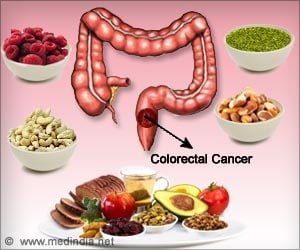Highlights
- Food additives can alter intestinal microflora and cause colorectal cancer.
- Colorectal cancer is the fourth leading cause of cancer death worldwide.
- Altered gut microbiota composition, causes intestinal inflammation
Gut microbiota is the diverse population of microorganisms found in the human intestines. Studies have shown that gut microbiota plays a key role in driving colorectal cancer. Gut microbiota also plays a role in two most common forms of inflammatory bowel disease (IBD) - Crohn's disease and ulcerative colitis. IBD causes colitis-associated cancer by promoting intestinal inflammation. Low-grade inflammation is a condition that is more prevalent than IBD and is observed in many cases of colorectal cancer.
Association Between Dietary Emulsifiers and Colorectal Cancer
Earlier studies conducted by Georgia State research team showed that regular consumption of dietary emulsifiers could promote inflammation in the intestine. Dietary emulsifiers are detergent-like molecules incorporated into processed foods that alter the composition of gut microbiota. Emulsifiers in food promote bacterial translocation across the epithelial cells.
"The incidence of colorectal cancer has been markedly increasing since the mid-20th century. A key feature of this disease is the presence of an altered intestinal microbiota that creates a favorable niche for tumorigenesis,” said Viennois, assistant professor in the Institute for Biomedical Sciences.
"The dramatic increase in these diseases has occurred amidst constant human genetics, suggesting a pivotal role for an environmental factor," said Chassaing, assistant professor in the Institute for Biomedical Sciences.
Effect of Emulsifiers in Gut Microbiota
The researchers observed that consumption of emulsifiers changed the species composition of the gut microbiota that made it more pro-inflammatory, leading to cancer induction and development.
Altered gut microbiota resulted in bacteria expressing more flagellin and lipopolysaccharide, which activate pro-inflammatory gene expression by the immune system.
The study found that consumption of dietary emulsifiers made the animals more susceptible to develop colon cancer as it created a pro-inflammatory environment, which is associated with an altered proliferation/apoptosis (cell death) balance. The development of colon tumor was associated with an altered gut microbiota.
In mice devoid of microbiota (germ-free mice), the effects of emulsifiers were not seen. When microbiota from emulsifier-treated mice was transplanted into germ-free mice, it altered the intestinal epithelial cells’ homeostasis. The study suggested that altered microbiota played a central role in tumor development.
The researchers concluded that microbiota interactions cause low-grade inflammation that can promote colon carcinogenesis. The research team is taking the study further by investigating which bacteria triggers cancer development, as well as the mechanism of altered microbiota-induced cancer promotion.
The findings of the study are published in the journal Cancer Research.
Colorectal Cancer
Colorectal cancer starts in the colon or rectum, which are parts of the large intestine. Globally, colorectal cancer is the fourth leading cause of cancer-related deaths. It is the most common type of cancer in the United States. In 2012, colorectal cancer claimed about 700,000 lives. Obesity, physical inactivity, unhealthy diet, smoking and heavy use of alcohol are some of the causes of colorectal cancer. Regular screening is one of the most powerful weapons to prevent colorectal cancer. Avoid consumption of processed foods such as sauces, canned foods, processed meats, to reduce the risk of developing colorectal cancer.
References
- The perfect mixture: emulsifiers make our food enjoyable - (http://www.eufic.org/article/en/food-safety-quality/food-additives/artid/emulsifiers-food/)
- Can colorectal cancer be prevented? - (http://www.cancer.org/cancer/colonandrectumcancer/detailedguide/colorectal-cancer-prevention)
















